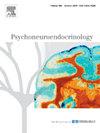α-GalCer regulates acute stress-induced steroidogenesis by modulating lipid metabolism in female BALB/c mice
IF 3.6
2区 医学
Q2 ENDOCRINOLOGY & METABOLISM
引用次数: 0
Abstract
The immune system orchestrates the hypothalamus-pituitary-adrenal (HPA) axis response to stress. However, the impact of invariant natural killer T (iNKT) cell activation on stress-induced glucocorticoid levels remains poorly understood. Alpha-galactosylceramide (α-GalCer), a specific agonist for iNKT cells, activates iNKT cells to produce inflammatory cytokines including interleukin (IL)-4 and interferon (IFN)-γ. Our findings indicate that treatment with α-GalCer 3 hours before acute restraint stress suppressed the elevation of adrenocorticotropic hormone (ACTH) but did not affect the increase in corticosterone (CORT) in mice. However, treatment with α-GalCer 24 hours prior to restraint stress did not alter the rise in ACTH but reduced the increase in CORT by about half. This dissociation between stress-induced ACTH and CORT levels suggests an intra-adrenal regulation of HPA axis responses to acute stress following α-GalCer treatment. We further found that administration of α-GalCer enhances lipid utilization within adrenocortical cells and elicits a hyperresponsive reaction to ACTH stimulation. Mechanistically, IL-4 elevates the expression of type II 3β-hydroxysteroid dehydrogenase/isomerase (HSD3B2) and scavenger receptor class B type I (SRBI) protein in adrenocortical cells, thereby facilitating ACTH-induced glucocorticoid release. Additionally, we observed that acute stress amplifies both α-GalCer-induced IL-4 and IFN-γ production as well as liver injury. Our findings not only elucidate the mechanistic basis underlying interactions between immunity and stress but also highlight potential targets for therapeutic intervention.
α-GalCer通过调节雌性BALB/c小鼠脂质代谢调节急性应激诱导的甾体生成
免疫系统协调下丘脑-垂体-肾上腺(HPA)轴对压力的反应。然而,不变性自然杀伤T (iNKT)细胞激活对应激诱导的糖皮质激素水平的影响仍然知之甚少。α-半乳糖神经酰胺(α-GalCer)是iNKT细胞的特异性激动剂,可激活iNKT细胞产生炎性细胞因子,包括白细胞介素(IL)-4和干扰素(IFN)-γ。我们的研究结果表明,在急性约束应激前几小时用α-GalCer 3 治疗可抑制促肾上腺皮质激素(ACTH)的升高,但不影响皮质酮(CORT)的升高。然而,在约束应激前24 小时用α-GalCer治疗并没有改变ACTH的升高,但使CORT的升高降低了约一半。应激诱导的ACTH和CORT水平之间的分离表明α-GalCer治疗后HPA轴对急性应激反应的肾上腺内调节。我们进一步发现,α-GalCer可提高肾上腺皮质细胞的脂质利用,并引起对ACTH刺激的高反应。在机制上,IL-4可提高肾上腺皮质细胞II型3β-羟基类固醇脱氢酶/异构酶(HSD3B2)和清道夫受体B类I型(SRBI)蛋白的表达,从而促进acth诱导的糖皮质激素释放。此外,我们观察到急性应激增加α- galcer诱导的IL-4和IFN-γ的产生以及肝损伤。我们的发现不仅阐明了免疫和应激之间相互作用的机制基础,而且强调了治疗干预的潜在目标。
本文章由计算机程序翻译,如有差异,请以英文原文为准。
求助全文
约1分钟内获得全文
求助全文
来源期刊

Psychoneuroendocrinology
医学-精神病学
CiteScore
7.40
自引率
8.10%
发文量
268
审稿时长
66 days
期刊介绍:
Psychoneuroendocrinology publishes papers dealing with the interrelated disciplines of psychology, neurobiology, endocrinology, immunology, neurology, and psychiatry, with an emphasis on multidisciplinary studies aiming at integrating these disciplines in terms of either basic research or clinical implications. One of the main goals is to understand how a variety of psychobiological factors interact in the expression of the stress response as it relates to the development and/or maintenance of neuropsychiatric illnesses.
 求助内容:
求助内容: 应助结果提醒方式:
应助结果提醒方式:


